'˜Low fat diet advice bad for obesity crisis' say health charities


The National Obesity Forum and Public Health Collaboration call for a “major overhaul” of current dietary guidelines that urge people to follow low fat diets and to lower their cholesterol.
They say the focus on low fat diets is failing to address Britain’s obesity crisis, while snacking between meals is making people fat. Instead, people should return to “whole foods”, such as meat, dairy and potatoes as well as high fat healthy foods including avocados, arguing that “eating fat does not make you fat”.
Advertisement
Hide AdAdvertisement
Hide AdThe report also argues that saturated fat does not cause heart disease while full fat dairy – including milk, yoghurt and cheese – can actually protect the heart.
Processed foods labelled “low fat”, “lite”, “low cholesterol” or “proven to lower cholesterol” should be avoided at all costs and people with Type 2 diabetes should eat a fat-rich diet rather than one based on carbohydrates.
The report also said sugar should be avoided, people should stop counting calories and the idea that exercise can help you “outrun a bad diet” is a myth. It recommended a diet low in refined carbohydrates but high in healthy fats as “an effective and safe approach for preventing weight gain and aiding weight loss”, which cuts the risk of heart disease.
The authors hit out at the “establishment” responsible for food science policies, such as Public Health England (PHE), which they say have been “corrupted by commercial influences”.
Advertisement
Hide AdAdvertisement
Hide AdIn a stinging rebuke, they compared the situation to that in big tobacco companies that bought the “loyalty of scientists” when a link was made between smoking and lung cancer. They said the recent Eatwell Guide from PHE was produced with a large number of people from the food and drink industry.
Some of the UK’s most senior health experts reacted with fury attempting to portray the report as “unscientific”, “cherry-picking” studies and “not peer reviewed”, an important part of the scientific publishing process.
Prof Tom Sanders, Emeritus Professor of Nutrition and Dietetics at King’s College London, released a lengthy response which included eight areas of the report he said were incorrect.
“This report muddles quality and quantity because you can still eat too much of a ‘good diet’,” he said.
Dr Alison Tedstone, chief nutritionist at PHE, said: “In the face of all the evidence, calling for people to eat more fat, cut out carbs and ignore calories is irresponsible.”